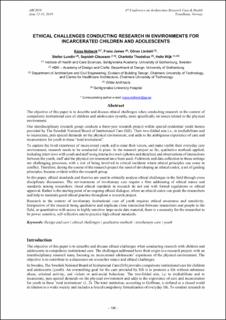| dc.description.abstract | The objective of this paper is to describe and discuss ethical challenges when conducting research in the context of compulsory institutional care of children and adolescents (youth), more specifically on issues related to the physical environment.
Our interdisciplinary research group conducts a three-year research project within special residential youth homes provided by The Swedish National Board of Institutional Care (SiS). Their two-folded aim i.e., to (re)habilitate and to incarcerate, puts special demands on the physical environment, and adds to the ambiguous experience of care and incarceration for youth in these “total institutions”. To capture the lived experience of incarcerated youth, aid to raise their voices, and make visible their everyday care environment, research needs to be conducted in place. In the research project so far, qualitative methods applied, including interviews with youth and staff using interactive tools (photos and sketches) and observations of interactions between the youth, staff and the physical environment have been used. Fieldwork and data collection in these settings are challenging processes, with a risk of being involved in critical incidents where ethical principles can come in conflict. Therefore, during the course of the research project the need of developing an ethical codex; a set of guiding principles, became evident within the research group.
In this paper, ethical standards and theories are used to critically analyse ethical challenges in the field through cross disciplinary discussions. The environments of involuntary care require a firm addressing of ethical stance and standards among researchers. Good ethical standards in research do not end with formal regulations or ethical approval. Rather is the starting point of an ongoing ethical dialogue, where an ethical codex can guide the researchers and help to maintain good ethical practice throughout a research project.
Research in the context of involuntary institutional care of youth requires ethical awareness and sensitivity. Irrespective of the research being qualitative and implicate close interaction between researchers and people in the field, or quantitative with access to highly sensitive large-scale data material, there is a necessity for the researcher to be power sensitive, self-reflective and to practice high ethical standards. | |

